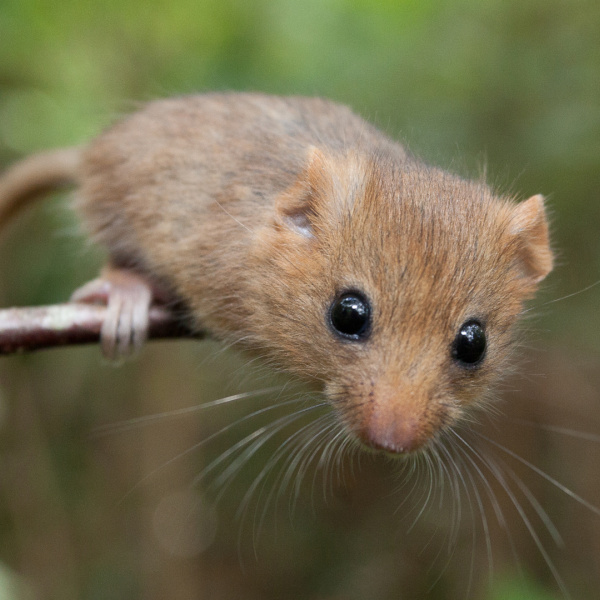One of the UK’s rarest mammals appears to be thriving in a wildlife-rich Devon woodland owned by animal welfare charity The Donkey Sanctuary.
Signs that hazel dormice were nesting were found in nest boxes during routine checks at Pig Wood at The Donkey Sanctuary’s Paccombe Farm in East Devon last month.
Paccombe Farm near the charity’s headquarters in Sidmouth, East Devon, is home to around 400 donkeys as well as 90 acres of woodland boasting rare bats, butterflies and birds.
Hazel dormice are officially classed as vulnerable in the UK and their populations have plummeted by more than 50% since 2000, according to the State of Britain’s Dormice 2019 report published by wildlife charity People’s Trust for Endangered Species (PTES). Their decline is being caused by the loss of quality woodland habitat and climate change.
The Donkey Sanctuary is carrying out work that will support the dormouse population at Paccombe such as hedge, woodland and scrub management which, as well as helping dormice also benefits the donkeys by providing them with woody browse material to chew and eat.
Dormice are mainly now confined to Wales and southern England, so their presence in habitat at The Donkey Sanctuary sites is very welcome.
Staff and volunteers from The Donkey Sanctuary’s Ecology and Conservation team installed dormouse, bird and bat boxes across the Pig Wood site adjacent to Paccombe Wood a few years ago.
During the autumn box checks, staff were delighted to discover several juvenile dormice as well as nests in six boxes
Ruth Angell, Ecology and Conservation Manager at The Donkey Sanctuary, said: “Hazel dormouse populations are vulnerable to habitat fragmentation and degradation.
“Finding them apparently doing well at The Donkey Sanctuary is fantastic and reinforces the importance of continuing to care for our semi-natural habitats to support this and many other wildlife species.
Thanks to our volunteers, we are able to carry out a range of field surveys and practical conservation tasks which really benefit our local wildlife and help inform our management.
The Donkey Sanctuary team will continue to monitor the boxes to gain a picture of how this site is used with the information gathered included as part of the National Dormouse Monitoring Programme (NDMP), a scheme to monitor dormouse populations.
Ian White, Dormouse and Training Officer from PTES (who manages the NDMP), said: “The National Dormouse Monitoring Programme has been running since 1990 and there are over 400 sites contributing data to the scheme. Without it we would not know that hazel dormice continue to decline rapidly in the UK, across much, if not all, of the country. It is also thanks to the NDMP and volunteers – like those at The Donkey Sanctuary – that we know in areas where the right habitat exists, dormice are doing well.”
“The NDMP provides the evidence base on which we are able to press strongly for continued and further conservation action to help this endearing species.”
“It is wonderful that a charity dedicated to improving the welfare of domesticated mules and donkeys is also able to help with the conservation of hazel dormice - a small, native secretive rodent whose populations are in steep decline. We hope their dormouse population continues to thrive in East Devon and hopefully one day spread further afield too."
Hazel dormice are small rodents with golden-brown fur, large black eyes and long whiskers. They are the only small British mammal with a furry tail. They are active during the warmer months in hedgerows and connected tree and shrub canopy and they hibernate in nests on the ground over winter.
They are usually found in connected habitats and landscapes, particularly those with traditionally-managed broadleaved woodlands and scrubby habitat linked by continuous hedgerows.
Staff and volunteers at The Donkey Sanctuary manage Paccombe Wood to improve biodiversity. This includes removing invasive vegetation and opening up the tree canopy in the form of wide open pathways (rides) and glades, which encourage a wide range of plants which then supports insects and other wildlife.
Hazel coppicing is a key part of The Donkey Sanctuary’s woodland management. Coppicing is a traditional method where trees or shrubs are cut back to ground level to promote new growth. Coppicing creates the structure and food that hazel dormice need.
Paccombe is also home to The Donkey Sanctuary’s training facilities and is not open to the public. To find out more about conservation volunteering with The Donkey Sanctuary email: [email protected]
Ends.
The Donkey Sanctuary is the world's largest equine welfare charity. Our vision is a world where donkeys and mules live free from suffering and their contribution to humanity is fully valued. We run 10 sanctuaries around the UK and Europe, giving lifelong care to more than 7,000 donkeys and mules. Our hospital treats sick donkeys and trains vets both nationwide and worldwide. Our donkey-facilitated learning programme helps vulnerable children and adults develop life skills by connecting with donkeys on an emotional and physical level. The charity operates programmes worldwide for animals working in agriculture, industry and transportation, and those used in the production of meat and skin.
About PTES
PTES, a UK conservation charity created in 1977, is ensuring a future for endangered species throughout the world. We protect some of our most threatened wildlife species and habitats, and provide practical conservation support through research, grant-aid, educational programmes, wildlife surveys, publications and public events.
PTES’ current priority species and habitats include hazel dormice, hedgehogs, water voles, noble chafers, stag beetles, traditional orchards, native woodlands, wood pasture and parkland and hedgerows.
PTES has Species Champions for three of its priority species: for hedgehogs The Rt Hon Chris Grayling, MP for Epsom & Ewell, for water voles The Rt Hon Hilary Benn, MP for Leeds Central and Chair of the Brexit Select Committee, and for dormice The Rt Hon Matt Hancock, MP for West Suffolk and Secretary of State for Health and Social Care. · Visit www.ptes.org and follow PTES on Facebook, Twitter, Instagram, YouTube & LinkedIn.
